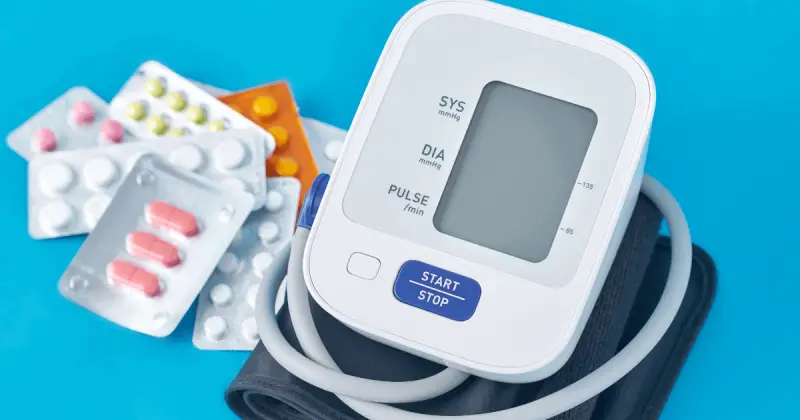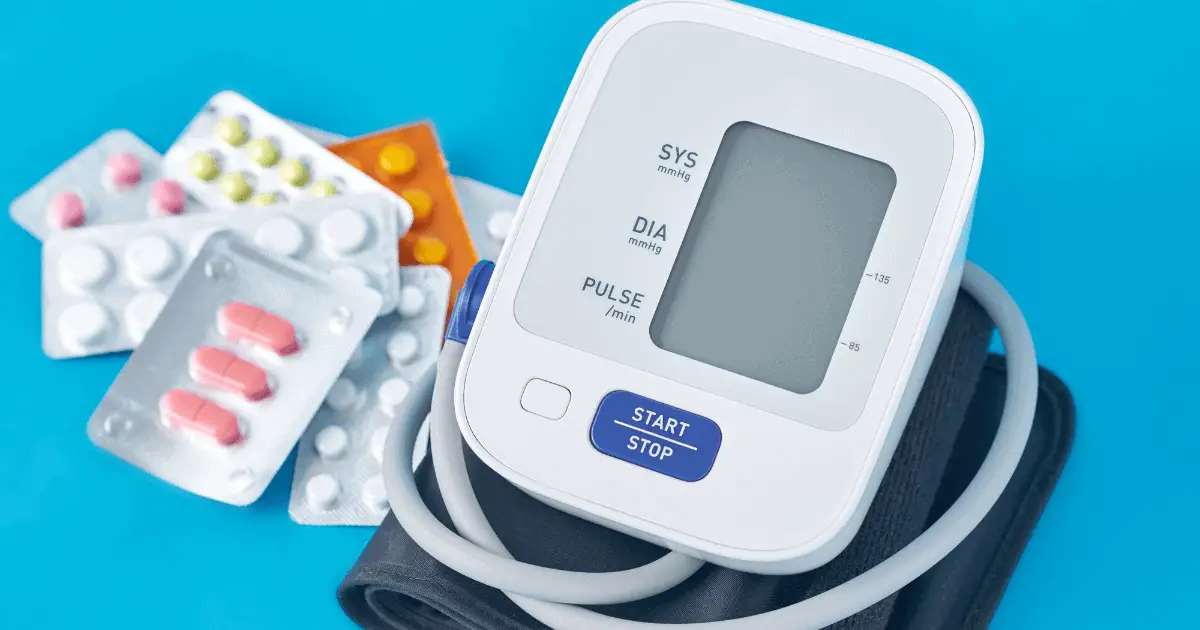Allergies are common, and while most people associate them with sneezing, itchy eyes, and congestion, many don’t realize they can also impact cardiovascular health. One question that often arises is: Can allergies cause high blood pressure? The answer is not simple — allergies themselves don’t directly raise blood pressure, but they can trigger or worsen conditions that lead to it.
This article explores how allergies and high blood pressure are connected, what factors contribute to this relationship, and how to manage both effectively.
Understanding Allergies and Blood Pressure

What Are Allergies?
Allergies occur when the immune system overreacts to substances known as allergens, such as pollen, dust, mold, or pet dander. When exposed, the body releases histamines and other chemicals, leading to symptoms like nasal congestion, inflammation, or breathing difficulty.
For most people, allergic reactions are mild and temporary. However, in some cases, especially when chronic, allergies can create physiological stress that indirectly influences blood pressure.
What Is High Blood Pressure?
High blood pressure (hypertension) occurs when the force of blood against artery walls remains consistently high. Over time, this pressure can damage arteries, increase the risk of heart disease, and strain vital organs like the kidneys and brain.
Blood pressure is measured in millimeters of mercury (mmHg) and recorded as systolic over diastolic pressure — for example, 120/80 mmHg. A consistent reading above 130/80 mmHg is typically considered high.
Can Allergies Cause High Blood Pressure?
The direct answer is no, allergies don’t directly cause high blood pressure. However, they can lead to secondary effects that raise blood pressure temporarily or chronically.
Allergic reactions cause inflammation and stress responses in the body, which may indirectly influence cardiovascular function. Furthermore, certain allergy medications, such as decongestants, are known to raise blood pressure levels.
Let’s break down how each mechanism works.
How Allergies May Indirectly Affect Blood Pressure
1. Allergic Inflammation and Stress Response
When the body experiences an allergic reaction, it releases inflammatory compounds like histamine and cytokines. These substances can cause the airways to swell and blood vessels to constrict, putting extra strain on the heart and circulatory system.
Chronic inflammation, particularly from seasonal or long-term allergies, may trigger stress hormones such as cortisol and adrenaline. Over time, elevated stress hormones can lead to higher blood pressure.
2. Breathing Difficulties and Oxygen Deficiency
Severe allergies, especially those involving nasal congestion or asthma, can restrict airflow and reduce oxygen levels. When the body senses low oxygen, it compensates by increasing the heart rate and blood pressure to deliver more oxygen to tissues.
If this occurs repeatedly or over long periods, it can contribute to hypertension or worsen preexisting cardiovascular conditions.
3. Sleep Disruption from Allergies
Allergies can cause congestion and sinus swelling that make breathing difficult at night. This can lead to sleep apnea or poor sleep quality, both of which are major risk factors for high blood pressure.
Sleep apnea causes intermittent pauses in breathing, forcing the body to wake up repeatedly. The resulting oxygen fluctuations activate the sympathetic nervous system, raising blood pressure and heart rate.
The Role of Allergy Medications in Blood Pressure Changes
One of the most common ways allergies can impact blood pressure is through over-the-counter (OTC) medications used to relieve symptoms.
1. Decongestants (Pseudoephedrine and Phenylephrine)
Decongestants are found in many allergy and cold medications. They work by constricting blood vessels in the nasal passages, reducing swelling and congestion. However, this same vasoconstrictive effect can raise blood pressure in the rest of the body.
Medications like Sudafed (pseudoephedrine) and phenylephrine are known to elevate blood pressure and are not recommended for individuals with hypertension.
2. Antihistamines
Antihistamines such as loratadine (Claritin) or cetirizine (Zyrtec) are generally safe for people with high blood pressure. However, older formulations like diphenhydramine (Benadryl) can cause drowsiness and affect heart rate in sensitive individuals.
Always consult a healthcare provider before combining antihistamines with blood pressure medications, as some may interfere with absorption or cause drowsiness that complicates cardiovascular monitoring.
3. Corticosteroids
Severe allergic reactions sometimes require corticosteroid treatments, such as prednisone. Long-term or high-dose steroid use can cause fluid retention and electrolyte imbalance, leading to temporary increases in blood pressure.
Can Seasonal Allergies Worsen Existing Hypertension?
Yes, they can. Seasonal allergies often trigger chronic inflammation, sinus pressure, and nasal congestion, making it harder for people with hypertension to breathe easily. The body’s natural stress response to these discomforts can elevate heart rate and constrict blood vessels.
Furthermore, many individuals with hypertension use multiple medications, and combining them with allergy treatments can lead to unwanted interactions or side effects that worsen blood pressure control.
Why This Connection Matters
If you already have high blood pressure, even mild allergic symptoms should not be ignored. Persistent nasal congestion, headaches, or difficulty breathing can stress the cardiovascular system further. Managing allergies effectively can significantly improve both breathing comfort and heart health.
Symptoms That Indicate an Allergic Impact on Blood Pressure
Physical Symptoms
-
Sudden dizziness or lightheadedness
-
Unexplained headaches or facial pressure
-
Rapid or irregular heartbeat
-
Shortness of breath or tightness in the chest
-
Fatigue due to sleep disturbance
Emotional and Stress-Related Symptoms
-
Increased anxiety or restlessness
-
Difficulty concentrating
-
Feeling “wired” or on edge, often due to decongestants or poor sleep
These symptoms don’t always indicate high blood pressure caused by allergies, but they warrant evaluation, especially in people already diagnosed with hypertension.
Who Is Most at Risk?
Certain individuals are more likely to experience elevated blood pressure as a result of allergy-related factors.
High-Risk Groups Include:
-
People with pre-existing hypertension or heart disease
-
Individuals who frequently use OTC decongestants
-
Those with chronic respiratory allergies or asthma
-
People who experience severe sleep disruption due to nasal congestion
-
Older adults with decreased cardiovascular resilience
Being aware of these risks can help in managing allergy symptoms safely while maintaining stable blood pressure levels.
Managing Allergies Without Raising Blood Pressure
It’s possible to control allergies effectively without aggravating blood pressure — with careful planning and medical guidance.
1. Use Blood Pressure-Safe Medications
Opt for antihistamines without decongestants, such as:
-
Loratadine (Claritin)
-
Fexofenadine (Allegra)
-
Cetirizine (Zyrtec)
Always check for labels marked “HBP safe” or “for people with high blood pressure.” Avoid products containing pseudoephedrine or phenylephrine unless prescribed by your doctor.
2. Use Nasal Sprays Wisely
Saline nasal sprays can relieve congestion without affecting blood pressure.
For persistent cases, doctors may prescribe steroid nasal sprays like fluticasone (Flonase) or mometasone (Nasonex), which have minimal systemic effects when used correctly.
3. Keep the Environment Allergen-Free
Reduce allergen exposure by:
-
Keeping windows closed during pollen season
-
Using HEPA air purifiers indoors
-
Washing bedding weekly in hot water
-
Vacuuming with a HEPA filter vacuum
Maintaining an allergen-free environment can reduce the need for medications that may affect blood pressure.
4. Manage Stress and Sleep Quality
Stress reduction plays a key role in controlling both allergies and hypertension.
Try relaxation methods like deep breathing, yoga, or meditation.
If allergies cause sleep disruption, consider using a humidifier or nasal strips to improve airflow at night.
When to See a Doctor
Seek medical advice if:
-
Your blood pressure remains high despite treatment
-
You experience chest pain, palpitations, or shortness of breath
-
Allergy medications seem to worsen your blood pressure readings
-
You suspect an interaction between antihistamines and blood pressure drugs
A healthcare professional may adjust your medications or recommend an allergy specialist for advanced testing.
Can Allergy Shots Affect Blood Pressure?
Allergy shots (immunotherapy) are long-term treatments that help the immune system build tolerance to allergens. While generally safe, they can cause mild local reactions or temporary systemic effects such as increased heart rate.
For people with hypertension, allergy shots are not contraindicated, but close monitoring is advised during the early stages of therapy.
The Importance of Monitoring Blood Pressure During Allergy Season
Allergy flare-ups can overlap with fluctuations in blood pressure, especially during spring and fall. Keep track of your readings daily, particularly if you use any allergy medications.
Home blood pressure monitors make this easy, and many modern devices can sync with smartphones to record trends. If you notice consistent spikes during allergy season, consult your healthcare provider.
Natural Remedies for Allergy Relief That Don’t Affect Blood Pressure
1. Steam Inhalation
Inhaling warm steam helps open nasal passages and reduce sinus pressure without raising blood pressure. Adding a few drops of eucalyptus oil can enhance relief.
2. Quercetin-Rich Foods
Quercetin, a natural antihistamine found in apples, onions, and berries, helps reduce allergic inflammation naturally. Including these foods in your diet may minimize allergy symptoms.
3. Local Honey
Consuming small amounts of local honey may help the immune system adapt to local pollen, although scientific evidence remains limited. It’s a harmless natural remedy worth trying for mild allergies.
4. Nasal Irrigation
Rinsing nasal passages with saline using a neti pot can clear out allergens and mucus buildup, reducing congestion and reliance on medication.
Prevention Tips for Allergy-Induced Blood Pressure Fluctuations
-
Monitor blood pressure regularly, especially when using new allergy medications.
-
Avoid caffeine and nicotine, which can compound blood pressure increases.
-
Stay hydrated to thin mucus and ease breathing.
-
Limit alcohol consumption during allergy flare-ups.
-
Get enough sleep to regulate stress hormones and maintain cardiovascular balance.
FAQs About Allergies and High Blood Pressure
Can antihistamines raise blood pressure?
Most modern antihistamines, like loratadine and cetirizine, are safe for people with hypertension. However, decongestant-containing formulas can raise blood pressure and should be avoided.
Can high blood pressure make allergies worse?
Not directly, but poorly controlled hypertension can reduce circulation efficiency, making inflammation from allergies feel more severe.
Should people with high blood pressure take allergy shots?
Yes, but under medical supervision. Allergy shots are safe but should be monitored for any cardiovascular effects during treatment.
How can I relieve allergy symptoms without medication?
Try saline sprays, air purifiers, nasal irrigation, and allergen-proof bedding to reduce symptoms naturally without affecting blood pressure.
Conclusion
While allergies do not directly cause high blood pressure, they can contribute to temporary or secondary increases through inflammation, medication use, stress, or disrupted sleep. People with hypertension should take precautions when managing allergies — avoiding decongestants, using blood pressure-safe antihistamines, and monitoring their cardiovascular health regularly.
Understanding the connection between allergies and high blood pressure empowers you to take proactive steps for both respiratory comfort and heart health. With careful management, you can keep your allergies in check without risking your blood pressure stability.
Disclaimer: This article is for informational purposes only and does not substitute for professional medical advice. Always consult your doctor before starting or changing any allergy or blood pressure treatment.



